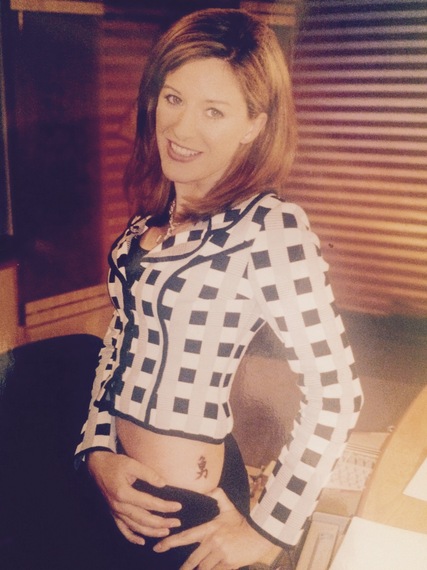In my imaginary appearance on Dragon's Den I'm extolling the virtues of my new invention: a machine that instantly and painlessly removes tattoos. All the dragons are in.
Last week's revelation that a line of Hebrew text (meaning "I am my beloved's and my beloved is mine") which runs from the nape of Victoria Beckham's neck down her spine has been gently fading away, led to questions over the state of her marriage. I think it's far more likely that it's the tattoo, not David, that has fallen out of favour.
![2015-09-25-1443188533-4098693-Andreawithtattoo.jpg]()
And I know how she feels. Back in 1997, I had been living in Hong Kong for almost five years, working as television news correspondent and presenter. It was coming up to the Handover, the return of Hong Kong to China and also the end of my stint in the region. In an area called Wanchai there is a famous old tattoo parlour that has been inking sailors for generations. where I decided to get a Chinese character tattooed on my hip.
It meant 'brave and strong', a similar meaning to my name. I was in my twenties and I thought it was the perfect symbol of my time in Asia, its permanence would be a reminder to me not to become too conservative or stuffy as I aged. I also had it, of course, because I thought it looked good; great, even. It sat between low waisted jeans and a cropped top in the late 90s saying that, despite the serious nature of my job, I was slightly rebellious, bohemian, free spirited.
In the intervening 17 years I may not have changed in the ways my twentysomething self worried I would, but tattoos have exploded in a way I certainly didn't predict. There are 1,500 tattoo parlours in Britain, double that of 10 years ago. Up and down the country from Aberdeen to Abergavenny they are inking everything from hieroglyphics to hummingbirds onto arms and ankles, backs and buttocks with the same regularity we once received our BCGs.
Now 20 million people in Britain have a tattoo, it feels about as free spirited as having a Tesco's club card. Back in my twenties, getting 'inked' was the kind of thing that still shocked your parents. Now, twentysomethings' parents are more likely to be getting their own: almost a quarter of 40 to 59-year-olds have one somewhere on their body, compared with one in six of those aged between 18 and 24. And a study from this summer found that today's novelty-seeking pensioners aren't just taking up backpacking and joining Facebook, some 5 per cent of over-60s are getting their first tattoo.
![2015-09-25-1443188626-847381-AndreaCatherwwod106.jpg]()
Now in my mid forties I don't deeply regret my tattoo, in fact I liked it for the first ten years. As it's on my hip, it's only visible on the beach, so I don't have to cover it up. But on the beach this summer, surrounded by Celtic swirls, Sanskrit and oriental calligraphy I felt like distinguishing my own with a little label, noting its interesting provenance and date - like a rare cheese at a farmer's market that just happens to look like cheddar.
Or, I thought seriously for the first time, I could just get it removed. After all, I don't wear the same watch, have the same hairstyle or even own a single item of clothing I had in the 90s - why was I hanging on to this?
A generation ago removing a tattoo was prohibitively painful. It involved dermabrasion, acid peels or literally cutting the image out and replacing it with skin grafts. More recently, celebrities like Angelina Jolie and Beyoncé have used lasers to erase tattoos that signified past relationships.
Following VB's decision to de-ink may be merely a fashion choice, but as ever, she's on trend. Recent statistics from the British Association of Dermatologists (BAD) suggest a third of people with tattoos regret them. And although getting them removed is an expensive, painful and lengthy process, costing between £50 and £300 a pop, for up to 20 carefully-timed sessions, the removal business is booming - growing 440 per cent in a decade in the U.S according to research firm IBIS.
UK stats are harder to come by, but new methods for tattoo removal as much as celebrity endorsement that could really drive the trend. A laser called PicoSure is the latest, which uses thermal energy in ultra-short pulses to break up the ink particles, which are then absorbed by the lymphatic system. This is supposed to mean fewer sessions and better results.
However, even with PicoSure, the consultant told me it could take between four to eight sessions to remove my small tattoo (and it's black, the easiest colour to erase). That would cost between £500 and £1000 depending on how many sessions it needed. Although an anaesthetic cream will alleviate some of the discomfort it would still be painful. Worst of all there's no guarantee it won't leave a scar.
I've already had one trial session of advanced laser tattoo removal which just a 1 cm test patch, it was quick and uncomfortable rather than painful but didn't make any noticeable difference to the pigment. It's also a laser system that breaks down the ink but normally requires 6 to 12 sessions . From the research I have done the PicoSure is the one promising the fastest results.
I've decided I'm prepared to suffer and be ink free on the beach next summer. In the meantime
if anyone out there comes up with that instant tattoo removal machine, don't trouble yourself with those pesky Dragons - I'll invest myself, in the sure fire knowledge it could make its inventor richer than the Beckhams.
Last week's revelation that a line of Hebrew text (meaning "I am my beloved's and my beloved is mine") which runs from the nape of Victoria Beckham's neck down her spine has been gently fading away, led to questions over the state of her marriage. I think it's far more likely that it's the tattoo, not David, that has fallen out of favour.

And I know how she feels. Back in 1997, I had been living in Hong Kong for almost five years, working as television news correspondent and presenter. It was coming up to the Handover, the return of Hong Kong to China and also the end of my stint in the region. In an area called Wanchai there is a famous old tattoo parlour that has been inking sailors for generations. where I decided to get a Chinese character tattooed on my hip.
It meant 'brave and strong', a similar meaning to my name. I was in my twenties and I thought it was the perfect symbol of my time in Asia, its permanence would be a reminder to me not to become too conservative or stuffy as I aged. I also had it, of course, because I thought it looked good; great, even. It sat between low waisted jeans and a cropped top in the late 90s saying that, despite the serious nature of my job, I was slightly rebellious, bohemian, free spirited.
In the intervening 17 years I may not have changed in the ways my twentysomething self worried I would, but tattoos have exploded in a way I certainly didn't predict. There are 1,500 tattoo parlours in Britain, double that of 10 years ago. Up and down the country from Aberdeen to Abergavenny they are inking everything from hieroglyphics to hummingbirds onto arms and ankles, backs and buttocks with the same regularity we once received our BCGs.
Now 20 million people in Britain have a tattoo, it feels about as free spirited as having a Tesco's club card. Back in my twenties, getting 'inked' was the kind of thing that still shocked your parents. Now, twentysomethings' parents are more likely to be getting their own: almost a quarter of 40 to 59-year-olds have one somewhere on their body, compared with one in six of those aged between 18 and 24. And a study from this summer found that today's novelty-seeking pensioners aren't just taking up backpacking and joining Facebook, some 5 per cent of over-60s are getting their first tattoo.

Now in my mid forties I don't deeply regret my tattoo, in fact I liked it for the first ten years. As it's on my hip, it's only visible on the beach, so I don't have to cover it up. But on the beach this summer, surrounded by Celtic swirls, Sanskrit and oriental calligraphy I felt like distinguishing my own with a little label, noting its interesting provenance and date - like a rare cheese at a farmer's market that just happens to look like cheddar.
Or, I thought seriously for the first time, I could just get it removed. After all, I don't wear the same watch, have the same hairstyle or even own a single item of clothing I had in the 90s - why was I hanging on to this?
A generation ago removing a tattoo was prohibitively painful. It involved dermabrasion, acid peels or literally cutting the image out and replacing it with skin grafts. More recently, celebrities like Angelina Jolie and Beyoncé have used lasers to erase tattoos that signified past relationships.
Following VB's decision to de-ink may be merely a fashion choice, but as ever, she's on trend. Recent statistics from the British Association of Dermatologists (BAD) suggest a third of people with tattoos regret them. And although getting them removed is an expensive, painful and lengthy process, costing between £50 and £300 a pop, for up to 20 carefully-timed sessions, the removal business is booming - growing 440 per cent in a decade in the U.S according to research firm IBIS.
UK stats are harder to come by, but new methods for tattoo removal as much as celebrity endorsement that could really drive the trend. A laser called PicoSure is the latest, which uses thermal energy in ultra-short pulses to break up the ink particles, which are then absorbed by the lymphatic system. This is supposed to mean fewer sessions and better results.
However, even with PicoSure, the consultant told me it could take between four to eight sessions to remove my small tattoo (and it's black, the easiest colour to erase). That would cost between £500 and £1000 depending on how many sessions it needed. Although an anaesthetic cream will alleviate some of the discomfort it would still be painful. Worst of all there's no guarantee it won't leave a scar.
I've already had one trial session of advanced laser tattoo removal which just a 1 cm test patch, it was quick and uncomfortable rather than painful but didn't make any noticeable difference to the pigment. It's also a laser system that breaks down the ink but normally requires 6 to 12 sessions . From the research I have done the PicoSure is the one promising the fastest results.
I've decided I'm prepared to suffer and be ink free on the beach next summer. In the meantime
if anyone out there comes up with that instant tattoo removal machine, don't trouble yourself with those pesky Dragons - I'll invest myself, in the sure fire knowledge it could make its inventor richer than the Beckhams.



















